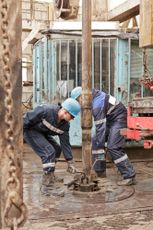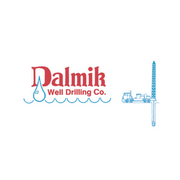
Rotary drilling is a technique that utilizes a sharp, rotating drill to make holes in the ground. It drills about five to seven times faster than a cable tool, letting you complete your project quicker. There are three main types of rotary well drilling: mud, air and dual. Below is a brief guide explaining the three.
Understanding Different Types of Rotary Well Drilling
Mud
 During mud rotary drilling, fluid is pumped down the drill pipe and then released out of the jets in the drill bit. The fluid then brings the cut materials through the hole and up to the earth’s surface. The materials will come together in a pit. The mud will then circulate from another trench and the suction hose will re-pump it into the drill bit.
During mud rotary drilling, fluid is pumped down the drill pipe and then released out of the jets in the drill bit. The fluid then brings the cut materials through the hole and up to the earth’s surface. The materials will come together in a pit. The mud will then circulate from another trench and the suction hose will re-pump it into the drill bit.
Mud rotary drilling is one of the quickest ways of drilling and can adjust to many conditions. This technique works best with sand, bedrock, and gravel formations.
Air
Air rotary well drilling picks up the cuttings from the drilled formation. The air will then be transported to the swivel hose connected to the drill pipe. The cuttings will be taken out of the area as the air leaves through the small ports in the drill pipe. The air will then push the cuttings up the surface. Frequently used for open-hole drilling, this method has a low impact on the environment and has increased penetration.
Dual
Dual rotary well drilling uses both an upper and lower head drive to push the drill bit and casing forward. A carbide-studded shoe allows the casing to cut through sand and cobbles. At the same time, a top drive rotary head uses a drill string to drill the center. This type of drilling can make straight holes in irregular formations and works well in the toughest overburden formations, such as gravel, glacial till, and boulders.
If you’re looking for drilling services in Putnam, CT, turn to the professionals at Dalmik Well Drilling. These well contractors have been in business since 1987 and offer everything from well drilling to well pump repair services. They take the time to evaluate your soil and water before beginning your project and offer free estimates. To schedule an appointment, call (800) 922-6220 and visit their website to learn more about their services.
About the Business
Have a question? Ask the experts!
Send your question

